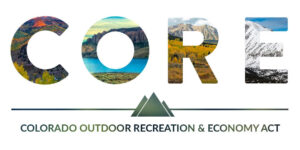Widgetized Section
Go to Admin » Appearance » Widgets » and move Gabfire Widget: Social into that MastheadOverlay zone
Bennet, Hickenlooper speak out strongly in support of CORE Act passage by Congress

Sens. Michael Bennet and John Hickenlooper spoke in support of the Colorado Outdoor Recreation and Economy Act, a bill that would establish a variety of protections for more than 400,000 acres of federally-owned land across Colorado, during a hearing last week before the Public Lands, Forests and Mining Subcommittee of the Senate Energy and Natural Resources Committee.
“The CORE Act is a testament to the hard work and commitment of people in my state who care deeply about protecting our public lands,” Bennet, a sponsor of the bill, said in testimony before the subcommittee. “They know how much public lands matter to our economy, our heritage, and our way of life. This bill is their best effort to strengthen and sustain that legacy for the next generation.”
A package of several public-lands proposals championed for years by local conservation groups, the CORE Act would add roughly 73,000 acres to new and existing wilderness areas across the state and withdraw more than 200,000 acres of federal land in the Thompson Divide area from future oil and gas development. It would also establish a first-of-its-kind “National Historic Landscape” designation around the site of Camp Hale, a World War II training facility located north of Leadville, and formally establish the boundary of the Curecanti National Recreation Area in Gunnison County.
Wednesday’s hearing marked the second time that the CORE Act has been taken up by the public-lands subcommittee, following a November 2020 hearing in which officials from the Trump administration spoke in opposition to the bill, which died in the Republican-controlled Senate. With Democrats now holding a narrow Senate majority, supporters of the CORE Act are hopeful that it can be passed this year.
Hickenlooper — who defeated former Sen. Cory Gardner, an opponent of the CORE Act, in the 2020 election, and now serves a member of the public-lands subcommittee — touted the bill as a model for local input and bipartisan cooperation.
“I think one of the things that’s truly distinguishing about this is that broad cross-section, including Democratic county commissioners and Republican county commissioners,” Hickenlooper said. “They made every effort to hear the issues — there were significant, substantial changes to the program made as it went through the 10 years of long work. But what they made is something that is deeply valued by the communities that made it.”
Editor’s note: This story was first published on Colorado Newsline, which is part of States Newsroom, a network of news outlets supported by grants and a coalition of donors as a 501c(3) public charity. Colorado Newsline maintains editorial independence. Contact Editor Quentin Young for questions: info@coloradonewsline.com. Follow Colorado Newsline on Facebook and Twitter.
Chase Woodruff
Latest posts by Chase Woodruff (see all)
- Colorado wildlife officials urge denial of request to suspend wolf reintroduction - December 23, 2024
- Public lands bills backed by Colorado Dems includes possible housing on USFS parcels - December 21, 2024
- Could Eagle County oil-train case wind up tied 4-4 with rare SCOTUS recusal? - December 11, 2024


